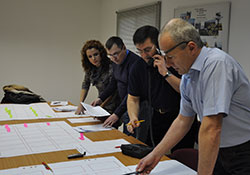WHO/Europe strengthens national capacity in emergency preparedness

WHO
Participants from countries in the WHO European Region took part in a workshop to train trainers to establish and develop national programmes to build capacity for risk reduction and the management of public health emergencies.
The main objective was to promote programmes in priority countries to help build a critical mass of emergency-management experts proficient in all-hazard emergency preparedness and risk management. Senior experts from Albania, Azerbaijan, the Czech Republic, Georgia, Kyrgyzstan, Poland, the Republic of Moldova and Ukraine, and from Kosovo (in accordance with Security Council resolution 1244 (1999)) took part. The workshop took place in Tel Aviv, Israel on 20–26 February 2012.
Following up, several countries plan to develop training programmes for public health and emergency management.
About the workshop
Using a range of adult learning concepts, interactive learning, extensive group work and discussions, the regional public health and emergency management (PHEM Euro III) workshop covered five technical modules, followed by a practical simulation exercise:
- emergency preparedness and building the capacity of the health sector;
- training principles of adult learning and development of training programmes;
- mass casualty management and medical surge capacity;
- public health programmes in health emergencies; and
- development of national PHEM courses.
WHO/Europe organized the event in collaboration with the Ministry of Health of Israel, the Ministry of Foreign Affairs of Israel (Centre for International Cooperation – MASHAV) and the Ben-Gurion University of the Negev.



